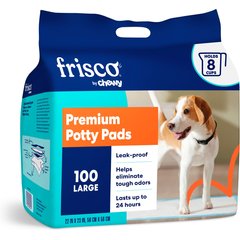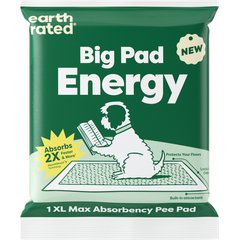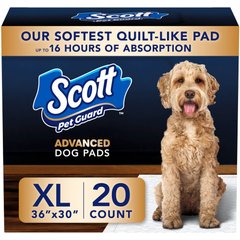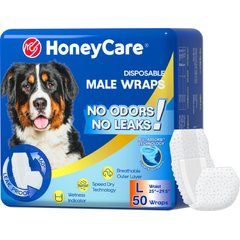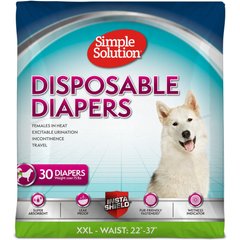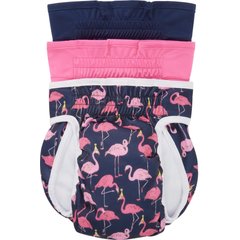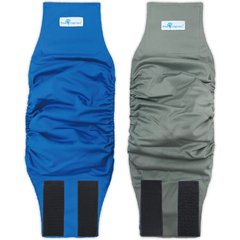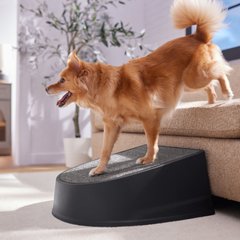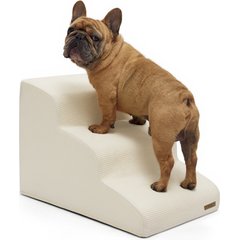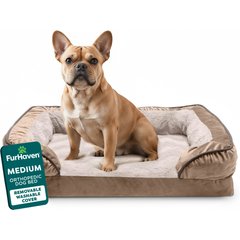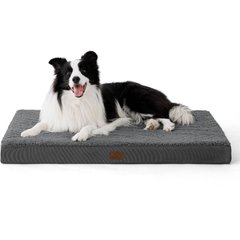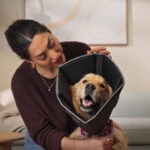Why Is My Senior Dog Peeing in the House? Understanding Senior Dog Incontinence
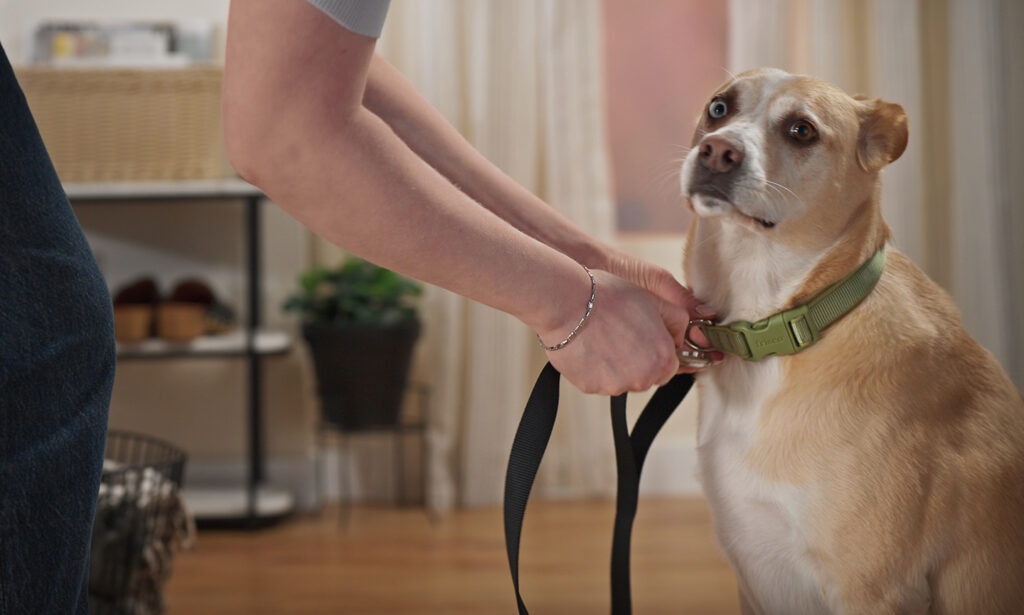
Photo by Chewy
If you’ve noticed a little dribble or wet patch on your senior dog’s bedding, you might wonder if they had a tiny accident in the house.
These can be signs of senior dog incontinence, a condition where an older dog loses control of their bladder, leading to unintentional leaks. While it can occur in dogs of any age, it’s especially common in seniors.
Here’s what to know about it and how you can support your pup through this stage of life.
Key Takeaways
- Senior dog incontinence is common and may be caused by changing hormones, UTIs, bladder stones, muscle weakness, or a host of other conditions.
- Wet spots on your dog’s bed or favorite places to sleep might be a sign that they have a bladder issue.
- See your vet early to identify the underlying cause. Many cases can be managed with medication, diet, or lifestyle changes.
- Invest in pee pads and doggy diapers to protect your home and keep your pup clean and comfy, and never punish them for having accidents.
What Is Incontinence in Dogs?
Incontinence is the loss of control over peeing, meaning your dog will leak urine without realizing it.
Most cases of urinary incontinence in dogs develop gradually, says Jamie Richardson, BVetMed, the head of veterinary medicine at Small Door Vet. She notes that sudden-onset incontinence can occur, but this usually indicates an acute, underlying health issue like a urinary tract infection or even diabetes.
Although any dog may be affected, it’s most common in middle-aged to senior dogs and medium- to large-breed female dogs.
Signs of Incontinence in Dogs
Some signs of incontinence are obvious while others are more subtle.
Here’s what to watch for:
- Frequent damp spots on your dog’s bed or favorite sleeping spots
- Dribbling urine when walking, sleeping, or waking
- Licking around the genital area more than usual
- Irritated or damp skin near the groin or hind legs
- Drinking more water along with leaking
- Your dog seems surprised or confused after an accident
What Causes Incontinence in Senior Dogs?
According to Dr. Richardson, incontinence in senior dogs can stem from a variety of underlying health issues. Some of the most common include:
Urethral Sphincter Mechanism Incompetence (USMI)
USMI is the most common cause of incontinence in senior dogs. The urinary sphincters are the muscles that keep urine sealed inside the bladder and the body.
Max Jones, DVM, of Bahama Road Veterinary Hospital in Bahama, North Carolina, says USMI is most often linked to reduced estrogen levels in adult and senior spayed females.
“While the mechanism is not entirely understood, the lower estrogen levels seem to weaken the muscle that holds the bladder closed,” he says.
Dr. Jones also notes that larger breeds tend to be affected more often, and obesity can increase the risk.
Urinary Tract Infections (UTIs)
A urinary tract infection is usually caused by bacteria and causes pain and swelling in the bladder. It can make your dog feel the urge to urinate more frequently or cause dribbling between bathroom trips.
You might also notice straining, blood in the urine, or signs of discomfort.
Neurologic Disease
Spinal cord disease or damage (inflammation, trauma, pain, vertebral abnormality, paralysis, or cancer) can disrupt the signals between the brain and bladder. This can cause involuntary leaks or make it difficult for your dog to empty their bladder.
Conditions That Cause Excessive Thirst
Diseases, such as diabetes, Cushing’s disease, kidney disease, and some cancers, can lead to excessive thirst that increases how much they pee. When the bladder fills too quickly or too often, even a dog with normal bladder control can experience leaks.
Bladder Stones
Bladder stones are hard mineral deposits that form in the urinary tract and can interfere with normal urine flow. They can be very painful for your dog.
They may also cause straining, frequent urination, or blood in the urine, and sometimes lead to dribbling or accidents.
Age-Related Muscle Weakness
Like humans, dogs lose muscle tone as they age, including the muscles that help regulate urination. A weaker bladder or pelvic floor makes it harder for senior dogs to “hold it in,” so small leaks may become more frequent over time.
Other Causes
Dr. Richardson explains that true incontinence stems from medical causes, but certain mental or behavioral changes, such as anxiety or cognitive decline, can lead to accidents that mimic incontinence. Some dogs may also dribble a little urine when they’re overly excited.
Other health conditions, such as arthritis, can play a role too. A dog in pain may hesitate to get up and go outside, which can result in indoor accidents. The normal posture to urinate can also be uncomfortable, leading to leaking or accidents.
If your dog is experiencing incontinence, see a veterinarian as soon as possible; they may have a medical condition that is causing a lot of discomfort or that needs immediate attention.
4 Ways To Help a Senior Dog With Incontinence
While it can be frustrating to deal with leaks at home, incontinence is not your dog’s fault—in other words, don’t even think about punishing your pup for these accidents.
Take heart that with the right care, you can often reduce the incidence of leaks and maintain a clean home.
Visit Your Vet
The first and most important step in addressing incontinence is scheduling a visit with your veterinarian. A vet can run diagnostic tests, blood work, urine testing, and imaging, to help determine the underlying cause of your dog’s incontinence.
Dr. Jones says that dog incontinence is usually managed rather than cured, and the treatment approach depends on the underlying cause.
For USMI, “most spayed female dogs respond well to estrogen therapy with oral medications, such as estriol (Incurin) or diethylstilbestrol,” he says. He adds that non-estrogen dog incontinence medications, such as phenylpropanolamine (Proin), can also be effective.
For other conditions, treatment may include medication, dietary adjustments, lifestyle changes, or surgery for certain issues, such as bladder stones.
Lay Out Some Pee Pads
Placing pee–absorbent pads in your dog’s favorite resting spots can help protect your home and make cleanup easier.
Recommended Products
Try Doggy Diapers
Dog diapers can prevent leaks from reaching bedding, furniture, or carpets. Just be sure to change them regularly to prevent skin irritation.
A few highly rated diaper options to consider include:
Recommended Products
Offer Extra Support and Comfort
If arthritis or mobility issues are contributing to accidents, add dog ramps or stairs and nonslip rugs to make it easier and less painful for your dog to get up and move around when nature calls.
Recommended Products
Don’t forget a supportive, cozy bed, which can go a long way in keeping them comfortable and at ease.
Recommended Products
At the end of the day, your dog deserves a best friend, especially when they’re not quite feeling their best. It’s up to you to save the day—with a vet’s help, they’ll hopefully be having fewer accidents in no time.
FAQs About Dog Bladder Control
Is incontinence in senior dogs linked to dementia?
Sometimes. Cognitive dysfunction can cause dogs to forget house-training or become disoriented, which may look like incontinence. A veterinarian can help determine if dementia or another underlying medical issue is contributing to your dog’s incontinence.
Should I put down a senior dog with incontinence?
Your dog has been with you through thick and thin—you owe it to them to do the same and try to investigate and treat the underlying issue. However, if they also have a condition that is negatively affecting their quality of life, that is another conversation and one you should have with your vet.
What if my senior dog hasn’t peed all day?
If your older dog goes a full day without peeing, they may have a urinary blockage or another urgent medical issue. This is a medical emergency, and you should contact your veterinarian or take your dog to a pet emergency hospital right away.
Is it normal for older dogs to pee themselves?
Accidents can happen more often in senior dogs, but frequent leakage or urination while resting isn’t considered “normal aging.” It’s usually a sign of an underlying health problem. A vet visit is the best way to identify the cause and explore treatment options.
